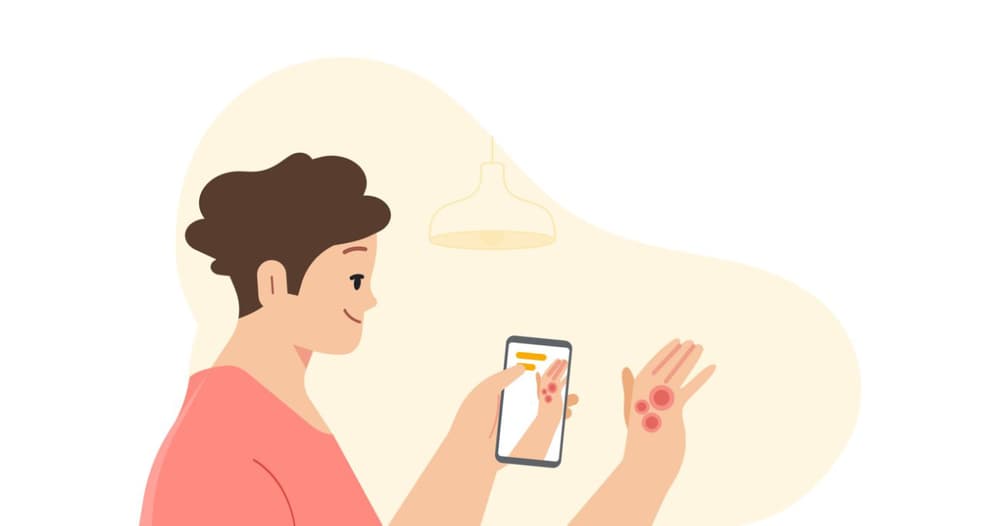AI-powered dermatology uses smartphone photos and advanced algorithms to detect skin conditions like acne, eczema, and skin cancer. These tools offer instant analysis, early diagnosis, and greater access to care—especially in remote areas—making skin health more accessible and proactive than ever.
AI-Powered Dermatology: Diagnosing Skin Conditions with a Photo
Written by Sumit Kaushik

In the selfie era, smartphones are no longer just a camera in your pocket but serious diagnostic tools. Thanks to AI dermatology, individuals can now diagnose acne, eczema, and even early stages of skin cancer by simply uploading a photo.
This revolutionary combination of AI and dermatology brainpower is revolutionizing the way we diagnose, treat, and manage skin conditions — taking pro-level treatment to the palm of your hand.
How It Works: AI Diagnosis of Skin Conditions
Dermatology apps using AI utilize machine learning algorithms that have been trained from enormous collections of dermatology images — thousands of cases of acne, melanoma, rosacea, psoriasis, and more.
This is how it generally happens:
- Take a high-definition photo of your skin with a smartphone.
- Post the image to an artificial intelligence-driven dermatology app.
- The AI examines features such as color, shape, texture, and border abnormalities.
- It cross-checks the image against a database and estimates a diagnosis or risk level.
Next steps recommended: self-care, over-the-counter medication, or referral to a derm.
Such apps provide users with immediate feedback that can prompt individuals to respond immediately — particularly in regions where professionals are not easily available.
Top AI Dermatology Apps
Some of these AI dermatology apps are already creating some buzz, including:
- SkinVision – App approved in some portions of Europe to scan moles and spots for the possibility of skin cancer.
- Aysa – Provides AI-suggested recommendations for skin rash and inflammation.
- Miiskin – Utilizes photo comparison technology to track moles and map the skin.
- Google DermAssist – Utilizes AI to examine uploaded images and suggest potential skin conditions (released in EU).
They both employ computer vision and deep learning to replicate a dermatologist's eye — but in seconds.
Advantages of AI in Dermatology
✅ Early Detection of Serious Skin Conditions: AI identifies suspicious moles or lesions that may be early-stage melanoma — potentially life-saving.
✅ Accessible to Everyone: Remote or underserved populations can obtain expert-level analysis on their own schedule without having to schedule appointments.
✅ Quicker Diagnosis and Treatment: Instant feedback allows users to more quickly treat acne, rashes, or infection with more favorable outcomes.
✅ Dermatologist Assistant Utility: AI complements the judgment of dermatologists rather than replacing them, allowing them to devote more time to difficult cases.
Real-World Impact
In 2020, a study in Nature demonstrated an AI system outperforming dermatologists to identify 26 common skin conditions. In a repeat test, melanoma identification with the help of AI beat human judgment alone.
Eczema patients, zit-ridden teens, or the merely worried about a suspicious-looking mole, AI mobile apps bring reassurance and confidence — anywhere, at any time.
Challenges and Considerations
- Accuracy Variability – AI accuracy is dependent on data and image quality variability. Most models still fall behind on darker skin tones.
- Privacy and Data Security – Storage and viewing sensitive skin images pose HIPAA compliance and data abuse concerns.
- Not a Replacement for Professionals – AI can provide advice, but no substitute for the subtle judgment of a dermatologist and in-clinic consultations.
The Future of AI-Powered Skin Care
With emerging technology, anticipate AI dermatology solutions to get increasingly:
- Personalized – Tailed treatments according to your skin type and previous history.
- Integrated – With telemedicine services for easy referrals.
- Global – Closing the dermatology gap in underprivileged regions of the world.
Imagine a world where your phone warns you of danger signs on your skin even before you see them yourself. Through sustained innovation and ethical research, AI can make dermatology accessible to everyone — rendering skin care sharper, safer, and more inclusive than ever before.
Final Thoughts
AI-fueled dermatology is not a tech trend — it's a revolution in skin health. Suddenly, with just a snapshot, individuals can get instant insights, raise awareness, and catch things early.
As skin cancer grows and there are not enough dermatologists globally, this technology literally could be the difference between life and death — and it's in the palm of your hand.